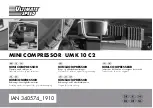
English
9
WARNING
Risk of bursting. Do not adjust regulator to result in
output pressure greater than marked maximum pressure
of attachment and/or the item being inflated. Never use
at pressure greater than 6.9 bar. Failure to heed this
could result in possible serious personal injury.
WARNING
Air powered tools may require more air consumption
than this air compressor is capable of providing. Check the tool
manual to avoid damage to the tool or risk of personal injury.
1. Connecting hoses to the air compressor.
2. Control the amount of air flow with the pressure
regulator knob. Turning the knob fully counterclockwise
will completely stop the flow of air.
NOTE:
Always use the minimum amount of pressure
necessary for your application. Using a higher
pressure than needed will drain air from the tank more
rapidly and cause the unit to cycle on more frequently.
3. When finished, always drain the tank .
DRAINING THE TANK
1. To help prevent tank corrosion and keep moisture out
of the air used, the air tank of the compressor should be
drained daily.
2. Turn the air compressor off.
3. Pull the ring on the safety valve to release until
pressure gauge reads less than 1.4 bar.
4. Release the ring.
5. Rotate drain valves counterclockwise to open.
6. Tilt tank to drain moisture from tank into a suitable
container.
NOTE:
Condensate is a polluting material and should
be disposed of in compliance with local regulations.
7. If drain valve is clogged, release all air pressure,
remove and clean valve, then reinstall.
WARNING
Shutdown the air compressor and release all air from the
tank before servicing. Failure to depressurize tank before
attempting to remove valve can cause serious personal injury.
8. Rotate drain valve clockwise until tightly closed.
CHECKING THE SAFETY VALVE
DANGER
Do not attempt to tamper with the safety valve. Anything
loosened from this device could fly up and hit you.
Failure to heed this could result in death or serious
personal injury.
The safety valve will automatically release air if the air
tank pressure exceeds the preset maximum. The valve
should be checked before each day of use by pulling the
ring by hand.
1. Turn the air compressor on and allow the tank to fill.
The compressor will shut off when the pressure
reaches the preset maximum.
2. Turn the air compressor off.
3. Pull the ring on the safety valve to release air for three
to five seconds to allow pressurized air to escape.
Release the ring. The safety release valve must
reset and hold pressure before all compressed air is
exhausted from the tank/pressure vessel.
4. Any continued loss of air after performing the above
steps indicates a problem with the safety valve.
Discontinue use and seek service before continued
use of the air compressor.
WARNING
If air leaks after the ring has been released or if the
valve is stuck and cannot be actuated by the ring, do
not use the air compressor until the safety valve has been
replaced. Use of the air compressor in this condition could
result in serious personal injury.
WARNING
When servicing, use only identical replacement parts.
Use of any other parts may create a hazard or cause
product damage.
WARNING
Always wear eye protection during maintenance. If
operation is dusty, also wear a dust mask.
WARNING
Always release all pressure, and allow unit to cool to the
touch before cleaning or making repairs on the air
compressor.
Содержание 4100802
Страница 2: ...FIGURE SHEET 6 1 2 3 4 5 8 7 10 9 Fig 1 ...
Страница 141: ......










































